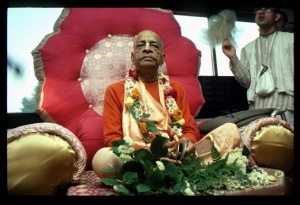CC Antya 10.19: Difference between revisions
No edit summary |
(Vanibot #0054 edit - transform synonyms into clickable links, which search similar occurrences) |
||
| Line 17: | Line 17: | ||
<div class="synonyms"> | <div class="synonyms"> | ||
''manuṣya-buddhi'' | ''[//vanipedia.org/wiki/Special:VaniSearch?s=manuṣya&tab=syno_o&ds=1 manuṣya]-[//vanipedia.org/wiki/Special:VaniSearch?s=buddhi&tab=syno_o&ds=1 buddhi]'' — considering an ordinary human being; ''[//vanipedia.org/wiki/Special:VaniSearch?s=damayantī&tab=syno_o&ds=1 damayantī]'' — the sister of Rāghava Paṇḍita; ''[//vanipedia.org/wiki/Special:VaniSearch?s=kare&tab=syno_o&ds=1 kare]'' — does; ''[//vanipedia.org/wiki/Special:VaniSearch?s=prabhura&tab=syno_o&ds=1 prabhura] [//vanipedia.org/wiki/Special:VaniSearch?s=pāya&tab=syno_o&ds=1 pāya]'' — at the lotus feet of Śrī Caitanya Mahāprabhu; ''[//vanipedia.org/wiki/Special:VaniSearch?s=guru&tab=syno_o&ds=1 guru]-[//vanipedia.org/wiki/Special:VaniSearch?s=bhojane&tab=syno_o&ds=1 bhojane]'' — by overeating; ''[//vanipedia.org/wiki/Special:VaniSearch?s=udare&tab=syno_o&ds=1 udare]'' — in the abdomen; ''[//vanipedia.org/wiki/Special:VaniSearch?s=kabhu&tab=syno_o&ds=1 kabhu]'' — sometimes; ''[//vanipedia.org/wiki/Special:VaniSearch?s=āma&tab=syno_o&ds=1 āma]'' — mucus; ''[//vanipedia.org/wiki/Special:VaniSearch?s=hañā&tab=syno_o&ds=1 hañā] [//vanipedia.org/wiki/Special:VaniSearch?s=yāya&tab=syno_o&ds=1 yāya]'' — there is. | ||
</div> | </div> | ||
Latest revision as of 19:32, 19 February 2024

A.C. Bhaktivedanta Swami Prabhupada
TEXT 19
- 'manuṣya'-buddhi damayantī kare prabhura pāya
- guru-bhojane udare kabhu 'āma' hañā yāya
SYNONYMS
manuṣya-buddhi — considering an ordinary human being; damayantī — the sister of Rāghava Paṇḍita; kare — does; prabhura pāya — at the lotus feet of Śrī Caitanya Mahāprabhu; guru-bhojane — by overeating; udare — in the abdomen; kabhu — sometimes; āma — mucus; hañā yāya — there is.
TRANSLATION
Because of her natural love for Śrī Caitanya Mahāprabhu, Damayantī considered the Lord an ordinary human being. Therefore she thought that He would become sick by overeating and there would be mucus within His abdomen.
PURPORT
Because of pure love, the devotees of Kṛṣṇa in Goloka Vṛndāvana, Vrajabhūmi, loved Kṛṣṇa as an ordinary human being like them. Yet although they considered Kṛṣṇa one of them, their love for Kṛṣṇa knew no bounds. Similarly, because of extreme love, devotees like Rāghava Paṇḍita and his sister, Damayantī, thought of Śrī Caitanya Mahāprabhu as a human being, but their love for Him was boundless. By overeating, an ordinary human being becomes prone to a disease called amla-pitta, which is a product of indigestion characterized by acidity of the stomach. Damayantī thought that such a condition would afflict Śrī Caitanya Mahāprabhu.